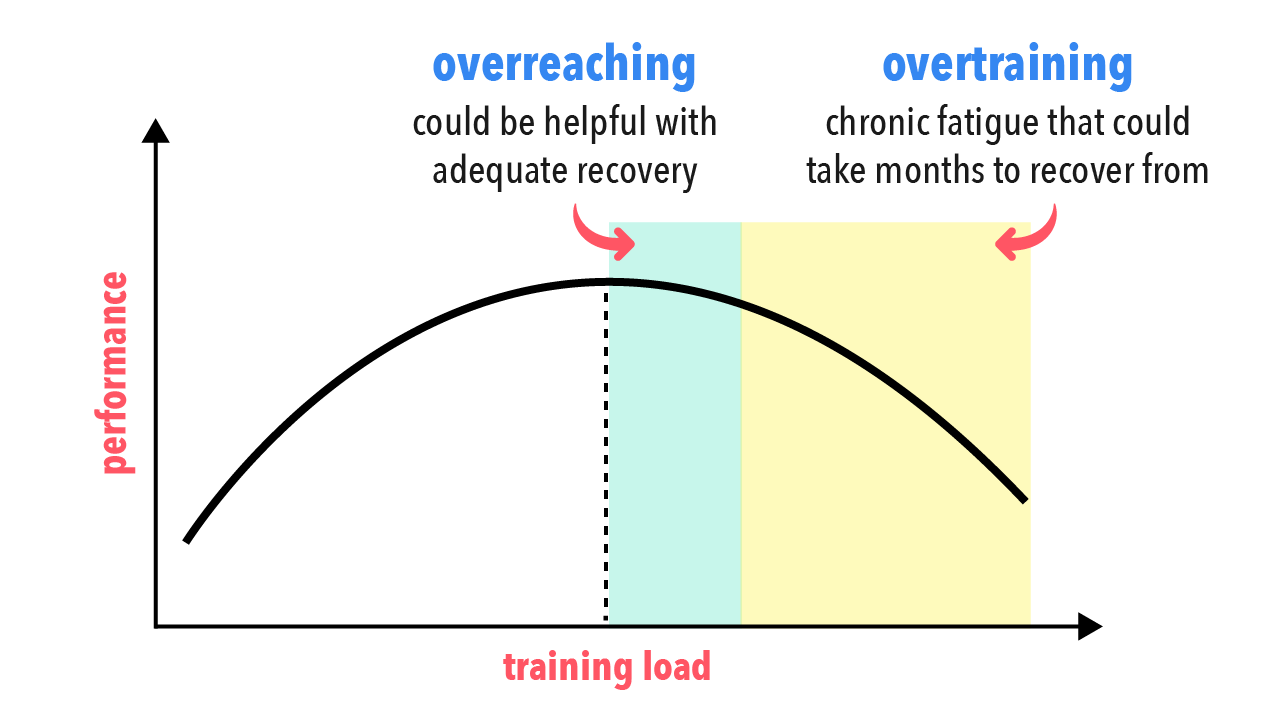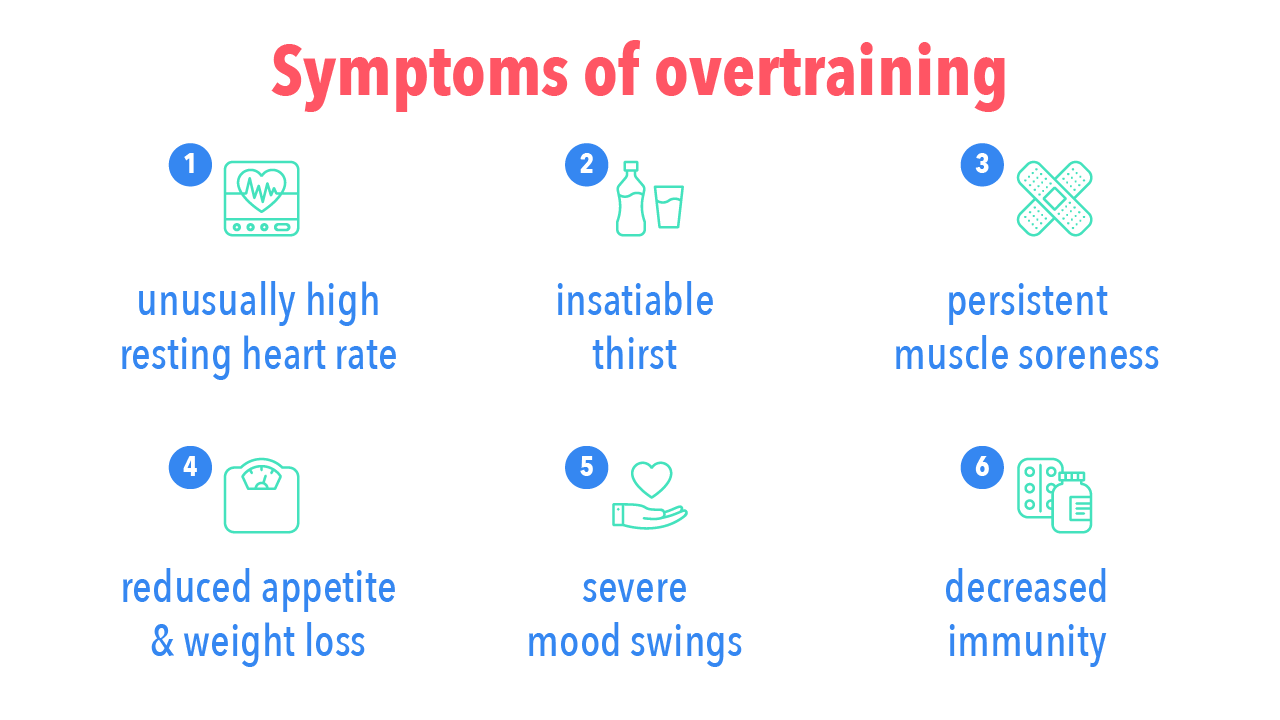Overtraining symptom, warning signs you must know.
Can't find the motivation to train? Experiencing wild mood swings? You could be overtraining. To find out if you are (and what to do about it), read this.

You love working out. So much so that you spend hours toiling at the gym, track, on the mat – working hard day by day, always focusing on when, where, and what your next session is. ?
When it comes to athletic pursuits, common sense tells us that more is better.
If bodyweight pushups can help sculpt your pecs, then barbell bench presses must be key to a massive chest… Right?
Well, that line of reasoning is true (it’s all about progressive overload). But only up to a point. Surprisingly, when it comes to training, you can have too much of a good thing.
And it’s known as overtraining.
What is overtraining?
The term overtraining is pretty self-explanatory.
This is simply a state you’d find yourself in when you don’t take time for proper rest and recovery–and experience a slew of negative symptoms, including increased risk of overuse injuries, decreased performance, loss of motivation, and even terrible mood swings.
It's an all-consuming black hole that can suck the joy out of training for you.
Before you start to scale back your training frequency, though, it's vital for you to first know about the distinction between overtraining and overreaching. You can think of the 'overtraining syndrome' as being on a spectrum.

Overreaching is the first phase of it; it's a temporary condition that occurs in response to heavy and/or intense loads when an athlete doesn't allow for sufficient recovery periods between hard workouts.
This phase typically manifests in decreased performance, extreme muscle soreness, disrupted sleep, and mild mood disturbances.
Interestingly, overreaching can be advantageous if appropriately utilized in a training split. It forces your body to adapt to increased loads–and that means you get stronger. But of course, that's only if your training program accounts for adequate recovery.
But for most of us, the natural response to decreased performance (as experienced with overreaching) is to train harder… This breaks the body down further and pushes it closer to an actual overtraining state.
This is where things get more dangerous.
While an individual could recover from overreaching in just a few weeks (provided he/she makes time for proper recovery), the same cannot be said for overtraining.
At its core, overtraining is a chronic condition of extreme fatigue. It’s a condition that can take months to recover from. Worse still, it’s also associated with recurrent or prolonged injuries like tendinitis or stress fractures.
Am I overtraining?
By now, the dilemma all athletes face should be quite evident.
Overtraining is bad. However, to get better and stronger (no matter the athletic domain), an athlete has to reach the overreaching phase, which just so happens to be the stage right before overtraining.
How does one straddle the line between the 2 phases to reap the most benefits from overreaching while avoiding all the negatives associated with overtraining?
Overtraining symptoms

Well, you could do that by recognizing the hallmark symptoms of overtraining–and modulating your training program in response. Below, find a list of overtraining symptoms you need to keep an eye out for:
• Unusually high resting heart rate – One physiological cue that you're overtraining is an elevated heart rate. This indicates that you're not recovering adequately, and in a desperate attempt to speed healing, your body is trying to pump more oxygen to healing tissues. It's not a good thing.
• Insatiable thirst – When you overtrain, your body is forced to break down your muscles for protein. And this catabolic process? It requires a ton of water. So, if you notice that you're ridiculously thirsty, no matter how much or what you drink, that's a sign you're overtraining.
• Persistent muscle soreness – It’s normal to have sore muscles for a day or two after working out. That’s how your muscle growth occurs, anyway. But if you’re still hobbling about past the 72 hours mark? Then that’s an indication of inadequate recovery (aka overtraining).
• Reduced appetite and weight loss – Typically, the more you work out, the hungrier you get. You’re burning more calories! But this doesn’t hold when you’re overtraining. That’s because working out too much can cause ghrelin and leptin levels (i.e. your ‘hunger’ hormones) to go out of whack in your body. Imaginably, when you eat less, you’d lose weight.
• Severe mood swings – Happy one moment, then having a full-on melt-down the next? Have your friends been commenting that you’re uncharacteristically moody and snappy? Chances are, you’re overtraining; a lack of recovery can affect your stress hormone levels, a known contributor to mood disturbances.
• Decreased immunity – Although regular exercise can help you fight colds and flu, overtraining does the opposite: it compromises your immunity, such that your body has a tougher time combating infections. What does that mean? Well, it means you'd find yourself visiting the doctor more often than you'd like!
Learn to take a break once in a while
The takeaway from it all? Rest days are crucial.
You should build them into your exercise routine no matter what your fitness goals are. And while there’s no set rule for how often you should take them, in general, you should always plan for more recovery days after higher-intensity activities (e.g. HIIT workouts or heavy compound lifts like the barbell back squat).
Of course, adding a recovery day (or two) isn’t the only thing you can do to prevent overtraining.
You should also look at how your training program is structured. Ensure that it’s challenging enough to place you squarely in the overreaching phase (which is beneficial for your progress in the short-term), yet not so much so that you’re pushed over the edge, right into overtraining territory.
Not sure how you can do that? Here's a secret: you don't have to.
Not if you get started with GymStreak, an AI-powered personal trainer app that customizes workout programs in line with your fitness goals–and ensures that you’re progressing in the gym without ever being at risk of overtraining.
Get GymStreakReferences
Halson, S. L., & Jeukendrup, A. E. (2004). Does overtraining exist? An analysis of overreaching and overtraining research. Sports Medicine (Auckland, N.Z.), 34(14), 967–981. https://doi.org/10.2165/00007256-200434140-00003
Kreher, J. B. (2016). Diagnosis and prevention of overtraining syndrome: An opinion on education strategies. Open Access Journal of Sports Medicine, 7, 115–122. https://doi.org/10.2147/OAJSM.S91657
Kreher, J. B., & Schwartz, J. B. (2012). Overtraining Syndrome. Sports Health, 4(2), 128–138. https://doi.org/10.1177/1941738111434406

